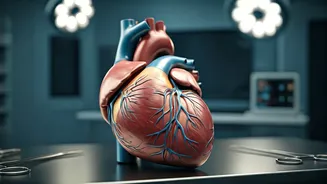Spotting the Signs
Identifying a heart attack when you're by yourself is critical. Key symptoms include chest discomfort, such as pressure, squeezing, or pain that might
radiate to the arm, jaw, neck, or back. Breathlessness, cold sweats, nausea, or lightheadedness can also occur. These signs can show up suddenly and without warning. Recognizing these symptoms means you need to act fast to increase your survival chances. Don't dismiss the pain as something minor, seek medical attention rapidly to limit damage.
Time Is of Essence
The amount of time you have between the first sign and a full-blown heart attack varies, but it's usually limited. Every minute counts, and quick action is critical. The sooner you can get help, the better the odds of surviving and minimizing damage to the heart muscle. Therefore, as soon as you experience the signs, call for emergency medical services (like 108 in India) immediately. Do not hesitate. Prompt action is essential for survival.
Aspirin's Role
Aspirin can be a beneficial option in a heart attack scenario, but only if a doctor advises you to take it. Its antiplatelet properties can help reduce blood clotting, which could reduce the damage. The recommended dosage is usually a regular strength aspirin (300mg) and should be taken as soon as you suspect an attack. However, aspirin is not recommended for those who are allergic to it or have any bleeding disorders. If in doubt, always consult a doctor.
Elevating Legs
Some people suggest elevating the legs as a method during a heart attack. However, there is no scientific proof for this. It can be a comfort strategy for some, but it will not solve the main issue. The priority is to get emergency medical help by calling for professional medical care. Medical professionals will offer the required aid to get you on the path to recovery. Don't rely on unproven methods; focus on getting help from trained experts.
Men vs. Women
Heart attack symptoms can differ. While chest pain is common for men and women, women might experience less obvious symptoms like nausea, back pain, or fatigue. These differences can lead to delays in seeking help, which are extremely dangerous. It's essential for everyone to be aware of the varied symptoms of a heart attack and to act immediately. Regardless of your gender, heart attacks are serious, and you should always seek medical attention straight away to increase the chance of survival.




















